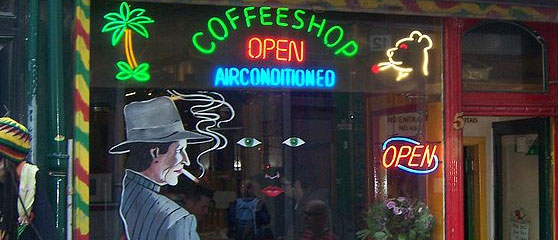Recent violent attacks on cannabis coffeeshops in the Netherlands highlight the urgent need for the country to regulate cultivation of the drug.
In the Netherlands, coffeeshops are café-style establishments in which the sale of cannabis for personal consumption is tolerated by local authorities. However, under Dutch law, large-scale cannabis cultivation or sale is illegal. Therefore, whilst coffeeshops have legal “front doors” for selling cannabis to consumers, their “back door” stocks cannabis illegally from criminal organisations.
There have been seven drive-by shootings on Dutch coffeeshops in 2016 so far. Although the police have not officially attributed blame for the violence, these acts of intimidation are seemingly indicative of disputes among the illegal groups that supply coffeeshops with cannabis.
These attacks are an indication of the glaring paradox in Dutch policy, of allowing cannabis to be sold in coffeeshops but criminalising its production and cultivation. These disputes, which endanger the public, could be immediately reduced if the government regulated cultivation.
Indeed, an opposition party in the Dutch parliament has introduced a bill that would legalise and regulate the cultivation of cannabis. The bill, put forward by the D66 party, would allow registered growers to cultivate large-scale cannabis plantations and sell their produce to local coffeeshops.
A 2013 poll suggested that 65 per cent of the Dutch public would support the production, sale, and consumption of cannabis being legal and regulated.
In September 2016, a slim majority of MPs suggested that they would back the bill.
If the bill is passed, the Dutch government will authorise certain businesses to buy and sell cannabis. Part of the D66 proposed legislation is to include a content analysis of cannabis sold to coffee shops that include a cannabinoid content, THC level, and information from where it was sourced.
Currently, it is illegal for individuals to grow more than five cannabis plants, and all plants must be less than a metre in height. Coffeeshops can stock up to 500 grams of cannabis at any one time, which is often insufficient to meet the demand of large cities, particularly in tourist-orientated areas.
By allowing coffeeshops to be supplied by an illegal market, the Dutch government is weakening its own credibility, public safety, and the power of law enforcement. It is also endangering public health, as there is no supervision of how plantations are cultivating the cannabis.
Vera Bergkamp, the D66 parliamentary member lobbying for this reform, expressed this concern last month during an interview with the Dutch National Broadcast (NOS): “People nowadays have no idea what they are smoking”.
Meanwhile, all of these sales are going untaxed, reducing the government’s ability to counteract the negative consequences of the illegal drug trade.
Despite this, there continues to be opposition to reform. Ard van der Steur, the Dutch justice minister, has expressed concern at the prospect of regulated cultivation. He has claimed that such reform would conflict with the government’s strategy of discouraging cannabis use among young people, according to DutchNews.
In 2014, the Dutch government made it clear that it opposed the idea of large-scale cultivation by prohibited aiding or assisting illegal cannabis production.
Despite a lack of consensus, the bill has strong support, and is expected to pass the House of Representatives. The D66 are pushing for the bill to pass before the next general election in March 2017.


